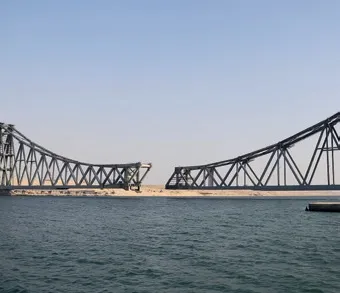Who’s to Blame?
2022-08-24ExcessivedebtshavebeeninflictedgloballybyWesternlendersByMaMiaomiao
Excessive debts have been inflicted globally by Western lenders By Ma Miaomiao
In his controversial book, American author John Perkins described how he was employed by a U.S. company to talk world leaders into accepting substantial infrastructure loans. If a hit man is completely successful, he said, “the loans are so large that the debtor is forced to default on its payments after a few years.”
This anecdote reveals just the tip of the iceberg when it comes to the excessive debts inflicted globally by the U.S. and some other Western countries, as well as their financial institutions. Despite this history,Western politicians and media say it’s China that is engaging in “debt-trap diplomacy” with other developing countries, especially those in Africa.
“Those Western countries are not ignorant of the true source of these debts, but are using their power to discredit China,” said David Monyae, Director of the Center for Africa-China Studies at the University of Johannesburg, South Africa. He also mentioned the recent debt crisis in Sri Lanka, another example of a false story told by the West that portrays China as the major source of a country’s debt.
In fact, according to the Sri Lankan Department of Foreign Resources, China’s share of the external public debt of the country is 10 percent. International capital market borrowing accounts for the lion’s share of the debt, 47 percent. Other creditors include the Asian Development Bank (13 percent), Japan (10 percent),the World Bank (9 percent), India (2 percent) and others (9 percent).
Debt trap?
Professor Justin Yifu Lin, former chief economist and Senior Vice President of the World Bank, said most discussions on so-called China’s “debt-trap diplomacy” are based on fiction rather than on fact. According to him, quite a number of African countries do have debt troubles, but a clear look into the most highly indebted countries shows that most of their debts are from Western countries.
A study released on July 11 by UK-based global debt watchdog Debt Justice said African governments owe three times more debt to Western banks, asset managers and oil traders than they do to China, and are charged double the interest by the Western lenders.
In May, Harry Verhoeven from the Center on Global Energy Policy at Columbia University, and Nicolas Lippolis from the Department of Politics and International Relations at the University of Oxford, also published a piece of research, saying the rise in African debt due to Chinese lending pales in comparison with the debt burden created by private creditors of other countries over the last decade.
According to Debt Justice’s calculations based on World Bank data, just 12 percent of African governments’ external debt is owed to Chinese lenders compared with 35 percent owed to Western private lenders.
African governments are due to pay an average interest rate of 5 percent on loans owed to Western private creditors in contrast with an average rate of 2.7 percent to Chinese lenders, the World Bank database shows.
“If African countries are deemed to be in a ‘debt trap,’ then they are trapped by other creditors, not China,” Lin said.

The two sections of a renovated railway bridge over the Suez Canal in Ismailia, Egypt, join together on June 5. Chinese companies undertook the project
“If African countries are deemed to be in a ‘debt trap,’then they are trapped by other creditors,not China.”
—Justin Yifu Lin,former chief economist and Senior Vice President of the World Bank
West should do more
“Western leaders blame China for debt crises in Africa, but this is a distraction. The truth is their own banks, asset managers and oil traders are far more responsible but the Group of Seven (G7)are letting them off the hook,” Tim Jones, head of policy at Debt Justice, said.
Western leaders through G7 have attributed the failure to make progress on debt restructuring to China, but the data shows that this is mistaken, the Debt Justice’s study said.
African money is actually pouring into the U.S.and Europe in the form of debt repayments, Xi Laiwang, an international studies scholar at Henan Normal University, said.
Charles Onunaiju, Director of Nigeria-based Center for China Studies, told Xinhua News Agency that Western private creditors also charge higher interest and offer a shorter period for repayment, describing them as manipulating and strangulating.
According to the International Monetary Fund(IMF), nearly a third of developing countries are in or near debt distress, and for low-income countries,the number is as high as 60 percent.
China has extended debt suspension to other developing countries during the pandemic, but private lenders in the West did not, Jones pointed out. “The UK and the U.S. should introduce legislation to compel private lenders to take part in debt relief,”he said. “There can be no effective debt solution without the involvement of private lenders.”
Lin explained that the debt viability depends on whether it stimulates economic growth and boosts export earnings or not. “The issue is not the debt volume but the debt-to-GDP ratio; the main problem emerges when a country is economically stagnant,” he said.
The loans given to Africa by Western lenders mainly go to non-production areas, contributing little to increasing tax revenues and foreign exchange earnings from exports of the recipient countries,according to Xi Laiwang. Governments of those countries are therefore forced into a vicious circle of borrowing without being able to pay off their debt.
China’s support
China has been participating in global coordination efforts such as the Group of 20 (G20)Debt Service Suspension Initiative for Poorest Countries, providing assistance and debt relief to help emerging market countries get out of the predicament as soon as possible.
“It (China) has put off more debt repayments than any other G20 member, signed agreements or reached common understandings on debt relief with 19 African countries, and engaged in the caseby-case debt treatment of Chad and Ethiopia under the G20 Common Framework,” Zhou Pingjian,Chinese Ambassador to Kenya, wrote in an article published in a Kenyan newspaper,, in July.
For example, Zambia’s official creditors, led by China, have agreed to provide debt relief to the southern African nation, paving the way for an IMF bailout and setting a precedent for how China could work with other lenders to tackle the threat of a wave of defaults across emerging markets, according to the.
In addition to helping highly indebted countries get out of their immediate dilemma, China is also promoting mutually beneficial cooperation with them under the framework of the Belt and Road Initiative to build up these countries’ economic strength. The China-proposed initiative aims to boost connectivity along and beyond the ancient Silk Road routes.
“We are seeing connectivity, we are seeing airports remodeling, and we are seeing ports remodeling,” Onunaiju said, adding that China’s support for Africa can be clearly felt in different areas.
Referring to the Lekki Deep Sea Port in Lagos State, Nigeria’s economic hub, as an example, he said the China-funded project will create up to 170,000 jobs and bring billions of U.S. dollars in revenues to the government through taxes, royalties and duties after beginning operation.
Lin said Africa needs massive infrastructure investment and industrial transformation so as to grow economically, both of which require international funding.
“If China can help bring the funds needed to improve power supply and road connectivity, even if it may cause a temporary increase in the debt level, African countries can make people productive to generate wealth,” he concluded. BR
